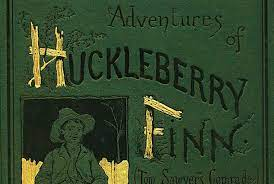Mark Twain publishes “The Adventures of Huckleberry Finn”
On February 18, 1885, Mark Twain publishes his famous—and famously controversial—novel The Adventures of Huckleberry Finn.
Twain (the pen name of Samuel Clemens) first introduced Huck Finn as the best friend of Tom Sawyer, hero of his tremendously successful novel The Adventures of Tom Sawyer (1876). Though Twain saw Huck’s story as a kind of sequel to his earlier book, the new novel was far more serious, focusing on the institution of slavery and other aspects of life in the antebellum South.
At the book’s heart is the journey of Huck and his friend Jim, a runaway enslaved person, down the Mississippi River on a raft. Jim runs away because he is about to be sold and separated from his wife and children, and Huck goes with him to help him get to Ohio and freedom. Huck narrates the story in his distinctive voice, offering colorful descriptions of the people and places they encounter along the way. The most striking part of the book is its satirical look at racism, religion and other social attitudes of the time. While Jim is strong, brave, generous and wise, many of the white characters are portrayed as violent, stupid or simply selfish, and the naive Huck ends up questioning the hypocritical, unjust nature of society in general.
Even in 1885, two decades after the Emancipation Proclamation and the end of the Civil War, The Adventures of Huckleberry Finn landed with a splash. A month after its publication, a Concord, Massachusetts, library banned the book, calling its subject matter “tawdry” and its narrative voice “coarse” and “ignorant.” Other libraries followed suit, beginning a controversy that continued long after Twain’s death in 1910. In the 1950s, the book came under fire from African American groups for being racist in its portrayal of Black characters, despite the fact that it was seen by many as a strong criticism of racism and slavery. As recently as 1998, an Arizona parent sued her school district, claiming that making Twain’s novel required high school reading made already existing racial tensions even worse.
Aside from its controversial nature and its continuing popularity with young readers, The Adventures of Huckleberry Finn has been hailed by many serious literary critics as a masterpiece. No less a judge than Ernest Hemingway famously declared that the book marked the beginning of American literature: “There was nothing before. There has been nothing as good since.”
SPORTS
2006
Shani Davis becomes first Black athlete to win individual gold medal at Winter Games
On February 18, 2006, Shani Davis becomes the first Black athlete to win an individual gold medal in Winter Olympics history, capturing the men's 1,000-meter speedskating race. American Joey Cheek wins the silver medal at the event at the Games in Turin, Italy.
US GOVERNMENT
2010
WikiLeaks publishes the first documents leaked by Chelsea Manning
On February 18, 2010, a relatively obscure website called WikiLeaks publishes a leaked diplomatic cable detailing discussions between American diplomats and Icelandic government officials. The leak of "Reikjavik13" barely registered with the public, but it was the first of what turned out to be nearly 750,000 sensitive documents sent to WikiLeaks by Chelsea Manning. Manning is now considered one of the most prolific and significant whistleblowers in American history, as her leaks shed light on atrocities committed by American armed forces, painted a far grimmer picture of the wars in Iraq and Afghanistan and greatly embarrassed the United States’ diplomatic establishment.
CRIME
2011
Green River serial killer pleads guilty to 49th murder
On February 18, 2011, in a Kent, Washington, courtroom, Gary Leon Ridgway pleads guilty to the 1982 aggravated, first-degree murder of his 49th victim, 20-year-old Rebecca Marrero. Marrero’s remains were found in December 2010, decades after her murder, in a ravine near Auburn,Washington. After entering his guilty plea, the 62-year-old Ridgway received his 49th life sentence without the possibility of parole and returned to the Washington State Penitentiary in Walla Walla, where he was already serving 48 consecutive life sentences, one for each of the other women he killed.
ART, LITERATURE, AND FILM HISTORY
1959
Ray Charles records “What’d I Say” at Atlantic Records
The phone call that Ray Charles placed to Atlantic Records in early 1959 went something like this: “I’m playing a song out here on the road, and I don’t know what it is—it’s just a song I made up, but the people are just going wild every time we play it, and I think we ought to record it.” The song Ray Charles was referring to was “What’d I Say,” which went on to become one of the greatest rhythm-and-blues records ever made. Composed spontaneously out of sheer showbiz necessity, “What’d I Say” was laid down on tape on this day in 1959, at the Atlantic Records studios in New York City.
INVENTIONS & SCIENCE
1930
Pluto discovered
Pluto, once believed to be the ninth planet, is discovered at the Lowell Observatory in Flagstaff, Arizona, by astronomer Clyde W. Tombaugh. The existence of an unknown ninth planet was first proposed by Percival Lowell, who theorized that wobbles in the orbits of Uranus and Neptune were caused by the gravitational pull of an unknown planetary body. Lowell calculated the approximate location of the hypothesized ninth planet and searched for more than a decade without success. However, in 1929, using the calculations of Lowell and W.H. Pickering as a guide, the search for Pluto was resumed at the Lowell Observatory in Arizona. On February 18, 1930, Tombaugh discovered the tiny, distant planet by use of a new astronomic technique of photographic plates combined with a blink microscope. His finding was confirmed by several other astronomers, and on March 13, 1930—the anniversary of Lowell’s birth and of William Herschel’s discovery of Uranus—the discovery of Pluto was publicly announced.
WESTWARD EXPANSION
1878
Murder ignites Lincoln County War
Long simmering tensions in Lincoln County, New Mexico, explode into a bloody shooting war when gunmen murder the English rancher John Tunstall. Tunstall had established a large ranching operation in Lincoln County two years earlier in 1876, stepping into the middle of a dangerous political and economic rivalry for control of the region. Two Irish-Americans, J.J. Dolan and L.G. Murphy, operated a general store called The House, which controlled access to lucrative beef contracts with the government. The big ranchers, led by John Chisum and Alexander McSween, didn’t believe merchants should dominate the beef markets and began to challenge The House.
ART, LITERATURE, AND FILM HISTORY
1929
First Academy Awards announced
The Academy of Motion Picture Arts and Sciences announces the winners of the first Academy Awards on February 18, 1929. It was a far cry from the suspense, glamour and endless press coverage surrounding the Oscars today: The first award recipients’ names were printed on the back page of the academy’s newsletter. A few days later, Variety published the information–on page seven. The ceremony was then held in May.
CRIME
2003
Arsonist sets fire in South Korean subway
On February 18, 2003, a man ignites a gasoline-filled container inside a subway train in Daegu, South Korea. The blaze engulfed the six-car train, before spreading to another train that pulled into station a few minutes later. In all, 198 people were killed and nearly 150 others were injured.
SPORTS
2001
Dale Earnhardt killed in crash
On February 18, 2001, Dale Earnhardt Sr., considered one of the greatest drivers in National Association for Stock Car Auto Racing (NASCAR) history, dies at the age of 49 in a last-lap crash at the 43rd Daytona 500 in Daytona Beach, Florida. Earnhardt was driving his famous black No. 3 Chevrolet and vying for third place when he collided with another car, then crashed into a wall. After being cut from his car, Earnhardt, whose tough, aggressive driving style earned him the nickname “The Intimidator,” was taken to a hospital, where he was pronounced dead of head injuries.
WORLD WAR II
1943
Nazis arrest White Rose resistance leaders
Hans Scholl and his sister Sophie, the leaders of the German youth group Weisse Rose (White Rose), are arrested by the Gestapo for opposing the Nazi regime. The White Rose was composed of university (mostly medical) students who spoke out against Adolf Hitler and his regime.











Comments
Post a Comment